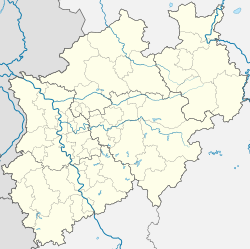Würselen (German pronunciation: [ˈvʏʁzələn] , Ripuarian: Wöschele [ˈβœʃələ]) is a town in the borough of Aachen, in North Rhine-Westphalia, Germany.
Würselen | |
|---|---|
 Saint Sebastian Church | |
Location of Würselen within Aachen district  | |
| Coordinates: 50°49′N 6°08′E / 50.817°N 6.133°E | |
| Country | Germany |
| State | North Rhine-Westphalia |
| Admin. region | Köln |
| District | Aachen |
| Government | |
| • Mayor (2020–25) | Roger Nießen[1] (CDU) |
| Area | |
• Total | 34.385 km2 (13.276 sq mi) |
| Elevation | 191 m (627 ft) |
| Population (2023-12-31)[2] | |
• Total | 38,750 |
| • Density | 1,100/km2 (2,900/sq mi) |
| Time zone | UTC+01:00 (CET) |
| • Summer (DST) | UTC+02:00 (CEST) |
| Postal codes | 52146 |
| Dialling codes | 02405 |
| Vehicle registration | AC |
| Website | www.wuerselen.de |
Geography
editWürselen lies north of the city of Aachen in the immediate vicinity of the tripoint of Belgium, Germany and the Netherlands. Its neighbouring settlements are, in clockwise order, the towns of Herzogenrath, Alsdorf and Eschweiler and the city of Aachen. Würselen is part of Aachen's Nordkreis quarter and is the only part of the city borough without external boundaries.
Subdivisions
editAs part of the administrative reform in North Rhine-Westphalia and the related 1971 Aachen Act, the territory of the borough of Würselen was expanded in 1972 to incorporate the hitherto independent municipalities of Bardenberg and Broichweiden. Since then Würselen has consisted of the following quarters:
- Bardenberg
- Broichweiden
- Würselen
These are subdivided in turn into the following parishes:
|
Würselen:
|
Broichweiden:
|
Bardenberg: |
Coat of arms
editThe coat of arms show the eagle of the coat of arms of Aachen in the topleft corner. The second quarter shows the coat of arms of the Rhine Province, however the bend also represents the river Wurm which flows through the town. The mining tools in the third quarter remember the mining history of the town, which dates back till the 12th century. The cross in the fourth quarter is the symbol of the prince-bishopric of Cologne, as the town belonged to the archdiocese of Cologne until the creation of the diocese of Aachen.
History
editDuring the time of the Roman Empire, Roman soldiers were based at Würselen, on an area today known as "Mauerfeldchen" (small mural field).
The first mention of the town was as Wormsalt in 870. Between 1265-69, Duke Wilhelm IV of Jülich built the castle of Wilhelmstein. Since 1616 the town has been known as Würselen. In 1972, the neighbouring municipalities of Bardenberg and Broichweiden were incorporated into the town.
Twin towns – sister cities
edit- Hildburghausen, Germany
- Morlaix, France
- Réo, Burkina Faso
- Campagnatico, Italy
- Ruichang, China
Notable people
edit- Jakob Dautzenberg (1897–1979), politician (KPD), resistance fighter against national socialism, Reichstag deputy
- Adolf Wamper (1901–1977), sculptor, created the Black Madonna in the War Crimes Camp 'Golden Mile'
- Jupp Derwall (1927–2007), football player and manager
- Jupp Kapellmann (born 1949), footballer
- Martin Schulz (born 1955), former leader of the Social Democratic Party of Germany, former President of the European Parliament, was Mayor of Würselen
- Nadine Capellmann (born 1965), dressage rider
- Der Graf (born 1970s), frontman and songwriter of the band Unheilig
- Roland Bartetzko (born 1970), soldier, charged with murder, attempted murder and terrorism
- Torsten Frings (born 1976), footballer
- Norman Langen (born 1985), percussionist
- Yannick Gerhardt (born 1994), footballer
- Achim Großmann (1947-2023), politician
References
edit- ^ Wahlergebnisse in NRW Kommunalwahlen 2020, Land Nordrhein-Westfalen, accessed 19 June 2021.
- ^ "Bevölkerung der Gemeinden Nordrhein-Westfalens am 31. Dezember 2023 – Fortschreibung des Bevölkerungsstandes auf Basis des Zensus vom 9. Mai 2011" (in German). Landesbetrieb Information und Technik NRW. Retrieved 2024-06-20.
- ^ "Partnerstädte". wuerselen.de (in German). Würselen. Retrieved 2021-02-17.
External links
edit- Official site (in German)
- German-Englisch Website
Gallery
edit-
View from the Market towards St Sebastian
-
The former mine Teut with its Malakoff tower in 1880
-
Church of St Nicolas
-
Marienhoehe Hospital



